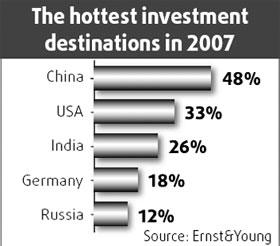China top choice for investors
By Zhang Ran (China Daily)Updated: 2007-07-05 08:52
China is the most attractive destination for foreign investment, according to a survey conducted by leading global professional services firm Ernst & Young.
Between February and March 2007, the survey asked 809 managers from various
industries in European, American and Asian firms about their investment
preferences. 
Almost half - 48 percent - of international investors cited China as one of their top three preferred business locations in 2007, up from 41 percent in the 2006 survey.
They said they were drawn to China for its low labor costs, more competitive rates and higher productivity. The country's infrastructure, quality of research and development, workforce education and political stability were cited as major advantages.
However, the survey revealed that China, while topping the rankings for its favorable labor costs, still lags behind in quality of workforce - only 4 percent of those surveyed said it is the most attractive country in terms of labor skills.
In addition, only 4 percent of respondents said China is the most attractive economy in terms of R&D availability and quality, as opposed to 43 percent for Europe and 27 percent for North America.
The survey ranked investment preferences on the basis of market and access, labor and productivity, fiscal, legal, environmental and regional issues.
The United States was found to be the second-most attractive country, finding favor with 33 percent of the respondents.
India's popularity appears to be increasing fast. While 11 percent of investors cited it among their top three preferences in 2004, it has risen to 26 percent in 2007.
Aside from India and China, the other two "BRIC" countries of Brazil and Russia feature much less prominently in terms of investor interest.
Despite Russia's abundant energy supplies, internal political uncertainties seem to deter investors. Similarly for Brazil, the considerable efforts by the government to secure macroeconomic stability have failed to convince corporate decision-makers.
(For more biz stories, please visit Industry Updates)